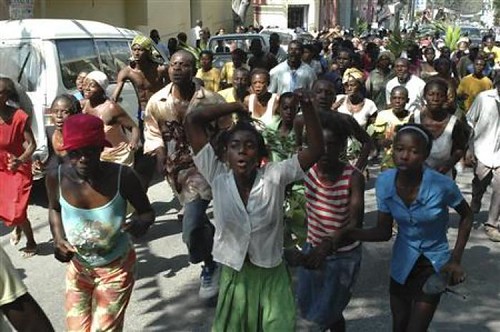
Haitians protest the lack of direct aid to the people of the Caribbean nation. An earthquake struck the country on Jan. 12, yet most people have not received the assistance they need., a photo by Pan-African News Wire File Photos on Flickr.
latimes.com/news/nationworld/world/la-fg-haiti-cholera-20110724,0,4930249.story
latimes.com
Haiti again caught in cholera's grip
More than 5,800 have died since the outbreak began in October. With the return of the rainy season afoot, more than 1,000 new cases a day were logged in June.
By Allyn Gaestel, Los Angeles Times
July 24, 2011
Reporting from Port-au-Prince, Haiti
Instead of the commuters typically packed into the bright blue and red "tap tap" pickup truck weaving through Haiti's capital, a man, shrunken, dehydrated, dressed in a diaper and attached to an IV, lay on the floor.
As the ad-hoc ambulance in Port-au-Prince attested, cholera refuses to leave the country.
The bacterial disease that ravaged Haiti last fall had spread quickly to all regions, but calmed down in the dry spring months. With the rainy season now in progress, clinics across the country are again bustling with seriously ill patients.
"We are still in … an epidemic," said Jocelyne Pierre Louis, spokeswoman for the government Ministry of Public Health.
More than 5,800 people have died since the epidemic began in October, according to the Haitian government. Many health workers believe the number is higher. Uncounted victims have died in remote areas of the country, never reaching services and never being added to government tallies.
The Health Ministry reported more than 1,000 new cholera cases a day last month.
For all the efforts to contain the disease, experts agree that the root of the problem is sanitation. Spread through contaminated water in a country with no central sewage or potable water systems, cholera remains a formidable threat.
"If we want to make cholera disappear, it will be with water and sanitation," said Romain Gitenet, head of the Haiti mission for France-based Doctors Without Borders, which has opened cholera treatment centers across the country.
Epidemiologists with the U.S. Centers for Disease Control and Prevention have cited a United Nations base housing Nepalese peacekeepers in the rural town of Mirebalais as the likely source of the epidemic. Cholera is prevalent in Nepal, a South Asian country. But the U.N. maintains that a "confluence of factors" led to the outbreak.
Government programs and private nonprofit health organizations have mounted a vigorous campaign, distributing chlorine and educating people on prevention and treatment, in an attempt to slow the spread of the disease.
Health professionals say the second wave is less deadly because more people recognize cholera symptoms, vomiting and diarrhea, and know to seek treatment quickly.
Louis, the Health Ministry spokeswoman, acknowledged that programs to equip communities with cisterns of clean water or cholera clinics did not address the causes.
"The problem of sanitation can't be dealt with between today and tomorrow," she said.
That problem was magnified by the Jan. 12, 2010, earthquake that crumbled much of the capital. A year and a half later, thousands of Haitians remain homeless.
At the edge of Cite Soleil, a Port-au-Prince slum, a small community called Tapi Vert still lives beneath dust-coated, fraying tarps.
On the outskirts of the encampment, temporary toilets stand without doors, without walls, full of excrement and sealed off with rocks.
"We don't have toilets. Those toilets are closed. They are full," said Rosette Michel, a 38-year-old mother of seven. She and one of her sons, a 10-year-old, contracted cholera in the last month.
"Kids sometimes use [the toilets], but grown-ups go in the bushes," said Jean Vital, another camp resident.
Many aid organizations and charities rushed to donate toilets to camps after the earthquake. But as time passed, many of those groups scaled down their activities, or pulled out altogether.
Supplying toilets but neglecting to empty them can be worse than not providing them in the first place, said Dr. Sasha Kramer, who runs SOIL, an organization that promotes sustainable sanitation such as composting toilets.
"The fact that the toilets have been put in and there hasn't been any follow-up or management is one of the biggest risks for cholera," she said. These forgotten toilets throughout the city are becoming pools of untreated human waste.
Tapi Vert residents said no one had come to empty the toilets in three months. The rainy season has made the situation more pressing.
"The rain falls and it overflows and green sludge leaks," said Marie-Ange Dossis, another resident. "It's not good for our health."
Gaestel is a special correspondent.
No comments:
Post a Comment